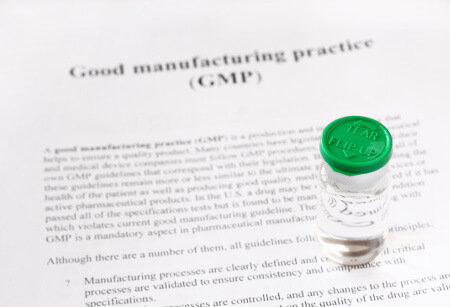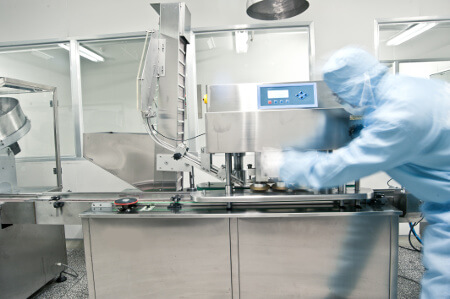
What is GMP?
GMP stands for Good Manufacturing Practices. While the name might evoke industrial settings like factories, GMP affects industries like food production, pharmaceutical companies, and medical devices and supplies. In addition to manufacturers, they also concern processors and packagers. The FDA checks companies from relevant industries to make sure they’re GMP compliant.
Essentially, GMP is a set of flexible regulations designed to maintain the quality of manufactured goods. They ensure goods must adhere to strict quality testing requirements that range from the raw ingredients being used to which laboratories can conduct quality control tests. Because each manufacturing process can vary wildly from one product to the next, the requirements are somewhat open to interpretation to ensure no manufacturer is held back.
Sometimes, cGMP is substituted for GMP. The “c” stands for “current”. It’s just a reminder for manufacturers to keep their technology up to date.
EU GMP, as the name indicates, refers to GMP regulations in the EU. While in the USA the FDA uses representative batches to evaluate both the product and the regulations, the EU gets its data from inspections. There are various other differences, mainly due to different laws and regulations at local levels. Despite the variance, adherence to GMP regulations ensure that goods can be exported and imported from different countries and can improve cooperation between manufacturers.

Why is GMP important?
It is paramount to ensure that drugs are effective and not dangerous for patients. It’s a matter of safety and trust. Consistency and waste reduction of are achievable by maintaining good standards across the manufacturing process t. For example, in a company that manufactures drugs and medicines, poor manufacturing practices can be costly and dangerous for patients.
GMP can help promote cooperation across states and other countries, since each manufacturer must adhere to specific standards. This in turn promotes innovation and competition.
These procedures can also help maintain traceability and help reduce the threat of contaminated products. In addition, hygiene, product purity and technological innovation are all mandated by GMP, so manufacturers must keep their processes clean and safe, and they’re driven to continually update and innovate their processes to streamline manufacturing and reduce costs.
Overall, GMP protects consumers and ensures the credibility and reliability of manufacturers, as well as sets standards for high quality products. These quality standards in turn help ensure that products made and sold are not contaminated, and that they’re reliable, safe and effective.

What’s the difference between GMP and GLP?
While they’re both quality assurance systems at their core, there are some key differences. GLP regulations are designed to ensure traceability of lab records to evaluate laboratories and make sure studies are conducted properly to ensure the integrity of the results. GMP regulations set quality control and quality assurance processes to uphold high manufacturing standards.
How do GMP affect weighing instruments?
Much like GLP, GMP sets some standards for the weighing equipment used in manufacturing and testing processed. As always, documentation is key. The scale or balance must have traceable measurements to ensure that the operator, the time, the date and all the calibration data are all verifiable. In addition, the accuracy, sensitivity, specificity and reproducibility of the weighing instrument must be recorded for evaluation.

Balances and scales used in areas under GMP regulations must conform to norms specific to their industries. For example, a commercial scale must be trade-approved under GMP regulations. They must feature a specific degree of accuracy and readability, and be under a certain threshold for Maximal Permissible Errors (MPE). There must be clearly defined routine maintenance and testing protocols in place to keep the instrument in optimal operation. Essentially, in order to ensure the quality of goods manufactured with GMP regulations, the instruments used during the process must prove their own quality.
Adam balances and scales promote traceability and feature printouts that include the time, the date and other logged information necessary to determine the instrument’s suitability and the reliability of the measurements obtained during measurements. Don’t hesitate to contact us; we’ll be glad to help you find the right balance for your needs.


